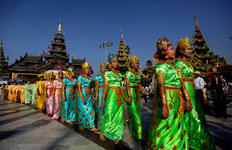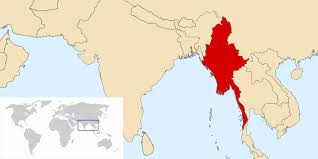|
It's crazy to think that I'm entering the final stretch of my time in Thailand. After several months of adventure and exploration, there are only 4 and a half weeks left of school. There's one big journey between me and finals: a trip to Myanmar, formerly known as Burma. I'm very excited for this journey, and history should be a big part of the experience.
Myanmar's two names speak to the nation's diverse heritage: over 100 different peoples live in the country. The largest group, the Bamar, gives the country one of its names. Myanmar has been populated for thousands of years, and a number of empires called the region home. The Burmese were once a dangerous force in Southeast Asia, and they destroyed one of Thailand's great kingdoms, Ayutthaya, several hundred years ago. In 1824, the British conquered and colonized the region. For the next 120 years, they ruled over Myanmar, despite the sometimes violent protests of local people. In 1948, after the horrors of World War II, Burma gained its independence. However, less than fifteen years later, the Burmese military staged a coup. For the next fifty years, democracy was virtually dead in Burma: generals ruled over all aspects of the society, and the country became one of the poorest in the world. In 1990, after years of protest and thousands of civilian deaths, the country held its first election. The National League for Democracy, lead by Nobel-Prize winning Aung San Suu Kyi, won 80% of the seats in Parliament. However, the military refused to turn power over, and ruled until 2011. In the last five years, the government has changed slightly, opening up space for more democratic processes. Yet, the generals have also developed a plan for 'disciplined democracy,' one that guarantees the military 25% of the seats in parliament, no matter what happens. This week, the country held elections and, once again, Aung San Suu Kyi's government won a large majority of seats. Time will tell how these events affect Myanmar's society. In the meantime, foreigners have been allowed to visit the country for the first time ever. I'm interested in seeing what this almost untouched land is like.
1 Comment
Leave a Reply. |
Adam De GreeI am a senior in college, studying philosophy, and am visiting family in the Czech Republic and travelling and studying in Europe and Asia. Archives
January 2016
Categories
All
|
|
SUPPORT
|
RESOURCES
|
|




 RSS Feed
RSS Feed



